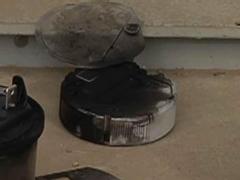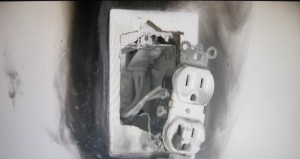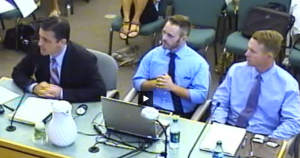Despite evidence that smart meters cause fires and explosions, in the following Stop Smart Meters video, a PG&E spokesperson says, that of all the nine million smart meters deployed in California PG&E has no reports of smart meters causing fires.
KO says a smart meter exploded-with a pop-pop-pop, flames and a big KABOOM- on her house. She has pictures showing the fire damage.
 In Bakersfield, media reports “a smart-meter blows up at a business”. The PG&E technician told the employee that he had replaced at least 15 meters around town due to the same problem.
In Bakersfield, media reports “a smart-meter blows up at a business”. The PG&E technician told the employee that he had replaced at least 15 meters around town due to the same problem.
Mr. Patrick Wrigley, a former PG&E meter reader told a Public Utilities Commission judge that he was fired because he was not wiling to be quiet about the smart meter problems he saw. He said, “These meters catch fire. They know it, and they are covering it up.”
The Berkeley fire department reported finding a smart meter “… hot to touch and smoking, with a orange glow inside the meter housing”.
 Ms. Moskow, a PG&E customer stated, “I had terrible electric problems in my house once the smart meter was installed, fire coming out one of the outlets, many outlets not working.”
Ms. Moskow, a PG&E customer stated, “I had terrible electric problems in my house once the smart meter was installed, fire coming out one of the outlets, many outlets not working.”
Two California fire department captains contacted the EMF Safety Network to report fire hazards associated with smart meters. We also know that PG&E settled out of court in a wrongful death suit where Larry Nikkel lost his life in a smart meter fire.
In January of 2010 PG&E admitted smart meters interfered with GFI’s and AFCI’s which are devices designed to protect from shock and fire. More smart meter fire stories here: http://emfsafetynetwork.org/?page_id=1280
Fires related to smart meters are reported in California, Florida, Georgia, Illinois, Maine, Pennsylvania, Texas, Australia, and Canada.






